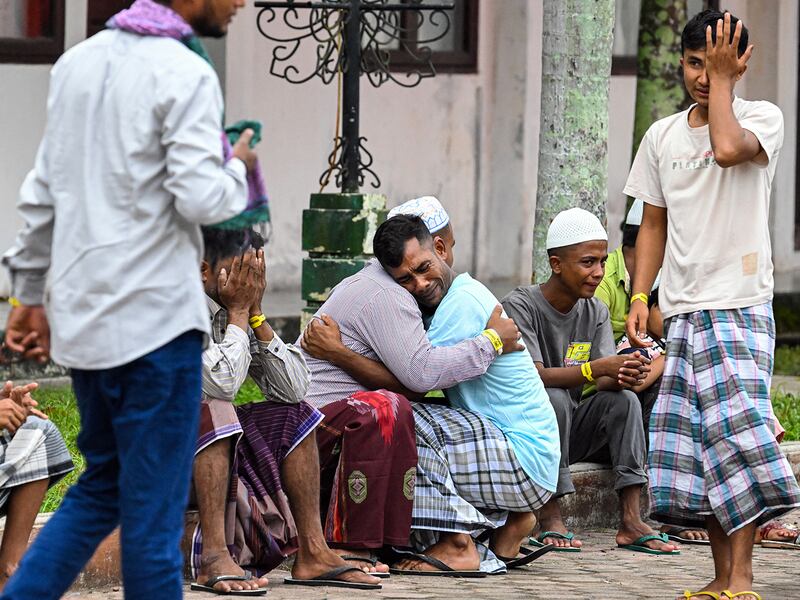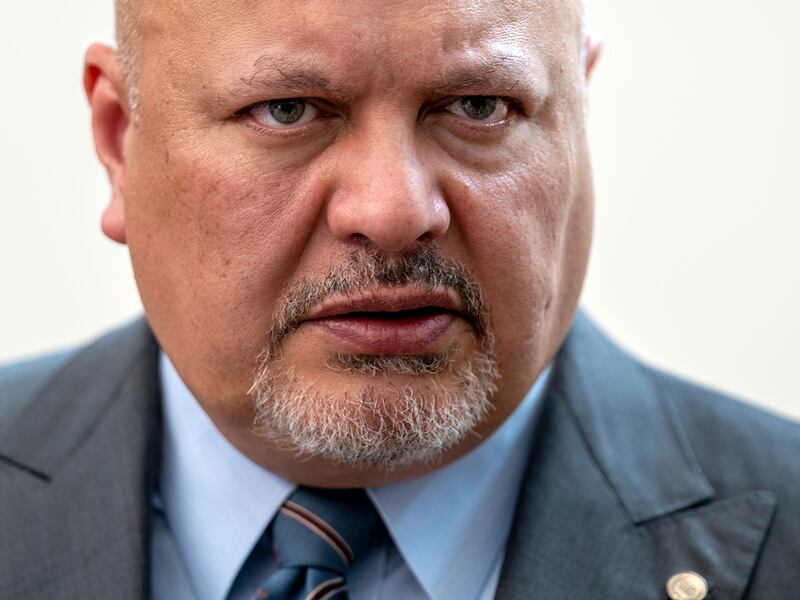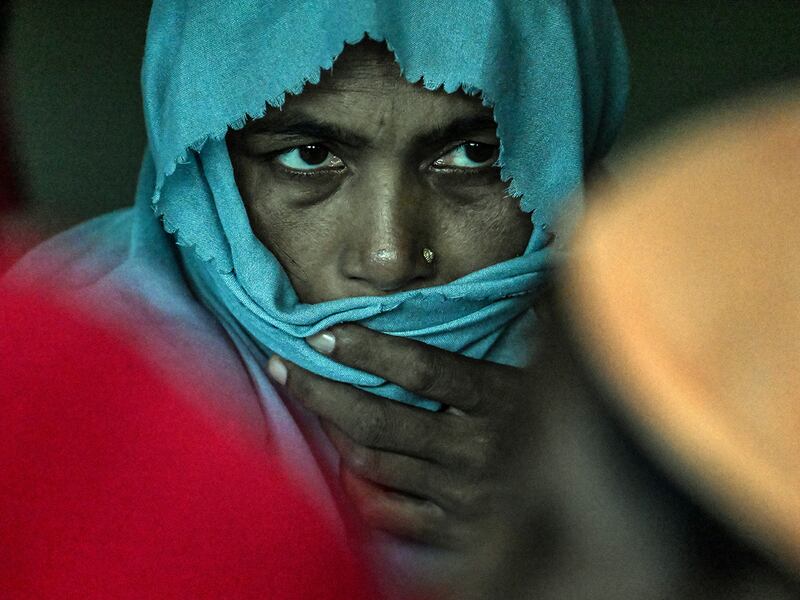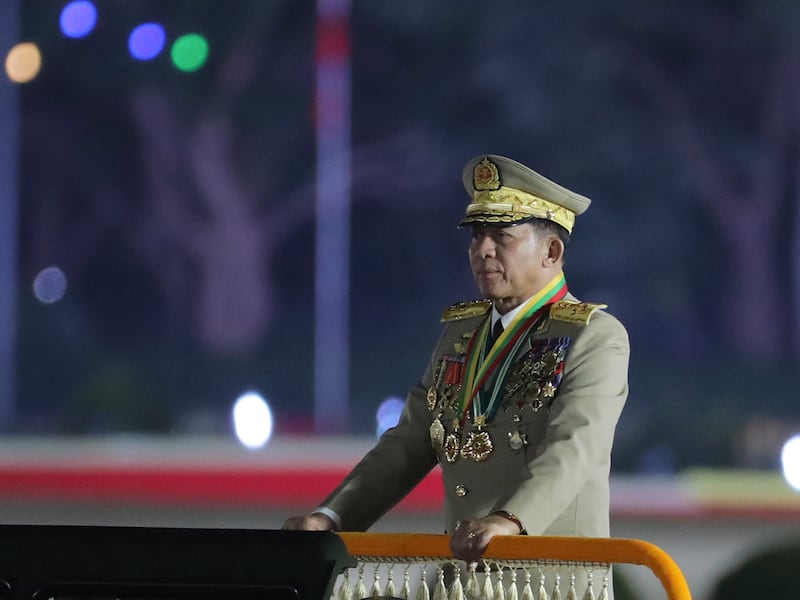There’s occasionally something to be said for symbolic gestures, but I struggle to get too worked up over the news that an International Criminal Court (ICC) prosecutor has finally applied for an arrest warrant for Min Aung Hlaing, Myanmar’s junta chief.
The Nov. 27 request is specifically over his military’s ethnic cleansing of the Muslim-minority group, the Rohingya, between 2017 and 2018. Human Rights Watch called it a “major step towards justice for the country’s Rohingya population.” Amnesty International regarded it as a “decisive step and an important signal.”
My disappointment is for two reasons: the local and the global.
The ICC hasn’t yet issued an arrest warrant; a prosecutor has applied for one. But even if a warrant is forthcoming, it won’t be acted upon.

Min Aung Hlaing won’t be hauled to The Hague while his junta holds power over much of the country and has the backing of Beijing.
If his junta defeats the revolutionary forces and ends the civil war, Min Aung Hlaing won’t voluntarily make a sojourn to the Netherlands.
If his junta falls and is replaced by a new, federal democratic Myanmar, we should vehemently oppose an international tribunal in favor of a local trial. In that eventuality, Min Aung Hlaing would have much more barbarism to answer to than only the Rohingya genocide.
China won’t act
Nor will an arrest warrant, if produced, alter the civil war itself. Min Aung Hlaing won’t give a fig; he claims lineage from the generals who for decades happily impoverished the nation and regarded citizens as property of the state.
Nor does Min Aung Hlaing have a real desire or need to leave Myanmar for anywhere other than China, which offered him his first invitation since the coup last month.
RELATED STORIES
International criminal court seeks arrest warrant for Myanmar junta chief
Families of Victims of Crackdown Call on ICC to Prosecute Myanmar Junta Leaders
Official: ICC Will Prosecute People Who Committed Crimes Against Rohingya in Myanmar
Yet China isn’t a member of the ICC, so won’t act upon an arrest warrant. From Southeast Asia, only Cambodia and Timor-Leste are signatories to the Rome Statute, so Min Aung Hlaing could visit any of the other nine states and probably wouldn’t be touched.
One might retort that the importance of the request for an arrest warrant lies in the “optics.” Certainly it’s a bad look for Southeast Asia.
Yet, what optics is this request supposed to change regarding Myanmar?
Granted, if the truth isn’t repeatedly stated, it risks being drowned by lies.
Yet the military’s crimes against the Rohingya have already been abundantly documented. The UN has called it “textbook ethnic cleansing.” The United States government called it a “genocide” in 2022.
If anyone needs convincing almost a decade on from the genocide and three years on from the military coup that Min Aung Hlaing isn’t a nice chap they’ve intentionally overlooked the evidence already to hand.

It isn’t as though most foreign governments have been sitting on the fence since 2021 waiting for something like an ICC arrest warrant before making up their mind whether they’re pro- or anti-junta.
The ICC prosecutor’s decision won’t isolate Min Aung Hlaing and his junta amongst friendly countries, nor motivate any more solidarity for the anti-junta revolutionaries from unfriendly states.
Waning global interest
Did China – not a signatory of the Rome Statute – even muster a shrug when this news of the warrant request broke? Is the United States – also not a signatory – now going to start supplying the anti-junta militias with proper weaponry because an international court might charge Min Aung Hlaing?
The ICC prosecutor failed to request an arrest warrant for Aung San Suu Kyi, who, though now deposed and detained, was head of the civilian government while the military was butchering the Rohingyas — a crime that Suu Kyi herself travelled to The Hague in 2017 to defend.

The global aspect of the problem is equally discouraging.
In June, Rohingya community members expressed disappointment at an ICC Pre-Trial Chamber that “enthusiasm for the ICC’s investigation appears to be at an all-time low.”
Prosecutors should have started requesting arrest warrants in 2017, but the ICC only started investigations in 2019. It was too late by the time of the February 2021 coup.
Bad timing
But now the ICC prosecutor’s request for a warrant couldn’t have come at a worse moment.
Just weeks earlier, the international court also issued arrest warrants for Israeli Prime Minister Benjamin Netanyahu and several members of his cabinet.
The ICC is now a spent force – a pariah not only in Moscow and other despotic nations but also in some Western capitals.
The United States has already rejected the court’s warrant for Netanyahu, and some Republicans want to sanction any country that assists the ICC in its pursuit of him.

The French government says it won’t comply with the Netanyahu warrant either because Israel isn’t a member of the ICC.
But neither is Myanmar a party to the Rome Statute, so hasn’t Paris just given Min Aung Hlaing a kind of Western-backed immunity?
For years the ICC has tried to rid itself of the criticism that it only goes after rulers of poor, internationally-weak nations while ignoring the crimes of first world leaders.
Unfortunately, by seeking to prosecute the leaders of Israel and Myanmar in the space of a few weeks, the court may have succeeded in removing that stigma – but at the cost of its credibility and authority.
David Hutt is a research fellow at the Central European Institute of Asian Studies (CEIAS) and the Southeast Asia Columnist at the Diplomat. He writes the Watching Europe In Southeast Asia newsletter. The views expressed here are his own and do not reflect the position of RFA.
